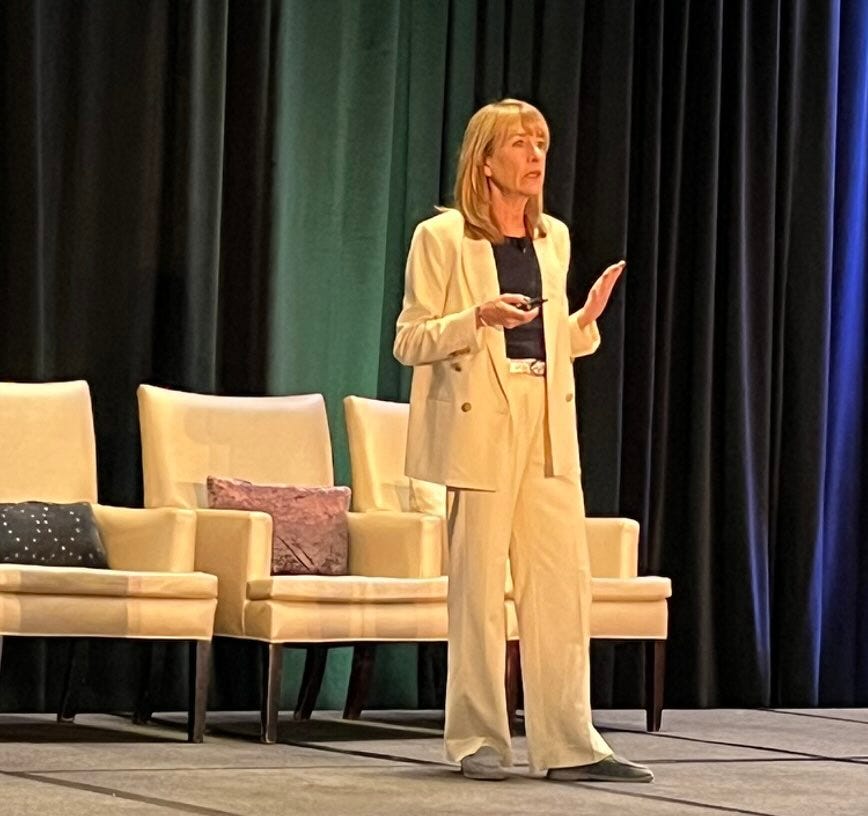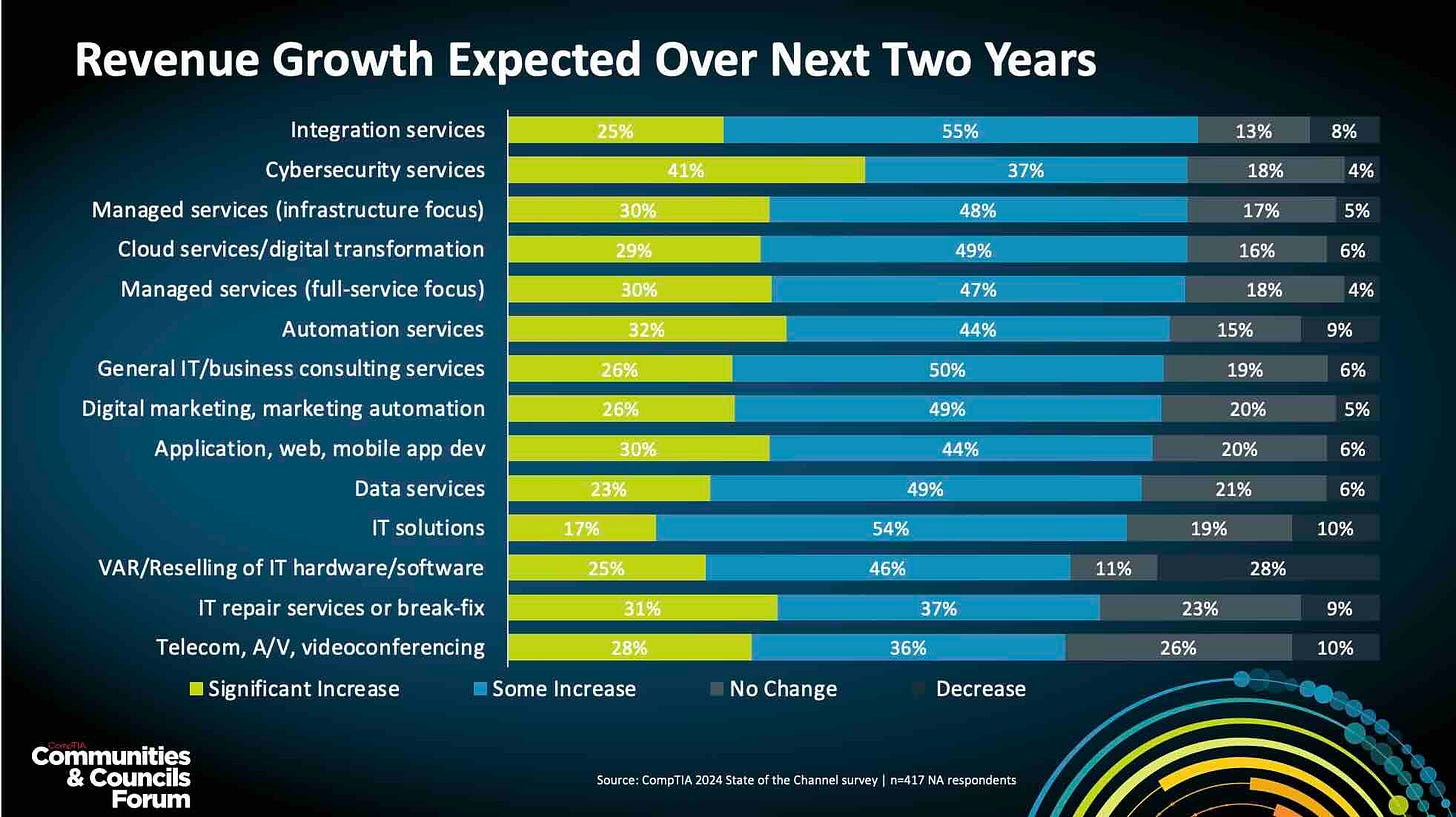My Fellow Channelholics, The State of the Channel Is…
Good, but in flux, according to new data from CompTIA on AI, security, and more. Plus: A new group advances women in IT, Channel Program adds distis, and ConnectWise’s PitchIT program delivers ROI.
Time flies when you’re a channelholic.
Hard as it is to believe, today marks this blog’s one-year anniversary, a fact I know in part because my first post ran immediately after CompTIA’s 2023 Communities & Councils Forum, and my latest one is appearing two days after the 2024 edition of that event.
A highlight of the show for yours truly (and other stat-loving attendees I spoke with) was a Tuesday morning keynote in which Vice President of Industry Research Carolyn April (pictured) shared reliably insightful highlights from CompTIA’s forthcoming 2024 State of the Channel study.
I’m quite sure I would have enjoyed the session under any circumstances. That the data April presented shed interesting light on five topics I’ve written about regularly in Channelholic’s first year made it even better.
Topic 1: Artificial intelligence
As we’ve noted several times in prior posts, most leading makers of RMM and PSA software view generative AI as a powerful productivity tool for MSPs, provided it’s implemented safely. Opinion is more divided, however, on whether AI is a near-term means of making money as well as saving it. Some smart people say yes. Other equally smart people disagree.
CompTIA’s research makes clear that few channel partners are billing for AI services today. Just 25% of them, in fact, offer “automation services” (a category encompassing AI) at present. That number appears set to begin growing rapidly soon, however.
“47% of channel firms said that they’re going to be selling generative AI solutions to their customers this year,” April notes.
And lest AI skeptics take comfort in the fact that over half of their peers won’t sell AI in 2024, consider this: 55% of partners who say their business is in better shape now than two years ago plan to sell AI this year, versus 32% of partners now in worse shape.
The smart money, it seems, is getting in early.
“AI is befuddling to many customers out there,” April says. “Services companies that are savvy right now are diving into the new area of innovation and they’re going to take advantage of it.”
Topic 2: Cybersecurity
The smart money is bullish on cybersecurity too. 44% of channel partners doing better now than two years ago currently offer security services versus 26% of partners doing worse.
Moreover, 51% of MSPs list security among the most in-demand services they offer at present, above SaaS solutions, remote management, and BDR. Yet to the confusion of many in April’s audience, just 38% of partners overall are offering security services at present.
“There’s a little bit of friction here between those who are offering it and what customers are clamoring for,” observes April, who expects that friction to ease soon.
“I think we’re going to see a big change in the coming year, as those who haven’t jumped on the cybersecurity bandwagon or only do basic virus, basic firewall to this point, are going to have to change their game,” she says. Indeed, 41% of the partners CompTIA surveyed foresee significant revenue growth in security over the next two years, way more than said the same about any other tech market.
Topic 3: Services and solutions
Speaking of revenue growth, check out these projections for the next two years from April’s presentation and see if you can spot the word that the top seven entries on the list have in common:
“Most of the things that are looking at significant revenue growth are services oriented,” April notes.
Which helps explain why 38% of channel partners now sell tech services, according to CompTIA, and just 27% sell tech products.
Furthermore, 35% of surveyed partners sell business solutions at present. That’s an encouraging figure for reasons familiar to regular Channelholic readers: outcome-based solutions are what end users increasingly want and the most profitable IT providers sell.
Topic 4: Marketplaces
Solutions drive profits up. The number one factor driving profits (and revenue for that matter) down, by contrast, is “competition and pricing pressure,” according to 49% of the partners CompTIA surveyed. April (like some others) is pretty sure online marketplaces from AWS, Microsoft, and others bear a lot of the blame.
“They’re a big competitor to the channel today, especially [partners] that are still very much selling products,” she says.
Partners agree. 36% of them, in fact, call marketplaces their primary competition, according to April. That’s less than the 49% who said the same in older research she presented at a CompTIA conference last August and less as well than the 40% who said “other channel firms” are their top competitors in the new study, but more than the 35% who cited vendors going direct.
April’s advice to anyone worried about competition from marketplaces is to stop competing with them. If a customer wants to buy something themselves on a marketplace, let them.
“Be the expert that helps the customer integrate, implement, deploy, and secure [it],” April says. “Then be the ongoing MSP that helps them work with that solution.”
Topic 5: Partner programs
As we told you here just last week, the channel’s getting choosy about partner programs. Four-fifths of them will reduce the number of vendor relationships they maintain to less than six this year, in fact, according to IDC.
CompTIA’s data paints a similar picture. Already, it shows, 29% of partners are enrolled in a mere one to four programs, and 11% are enrolled in none.
Which doesn’t mean partners have beef with vendors. To the contrary, they’re happier with the declining number they work with: 33% of partners currently call themselves very satisfied with their vendors, up from 18% last year.
“It just means that you’re more selective and that you’re choosing vendors that more align with your ongoing goals and your needs,” April explains. “Less is more, quality versus quantity, has led to greater satisfaction.”
By the way…
A big thank you to everyone who’s joined me for Channelholic’s ride this first year. Your numbers keep going up (over 10% just in the last 30 days!), so I must be doing something right at least some of the time. Tell your friends!
A new push to advance women in IT
The first thing Kathleen Martin (pictured) wants you to know about the Advancing Leadership Network (ALN), a newly launched women in tech group, is that it isn’t a women in tech group.
“You can’t go to an event without tripping over a women in tech group,” she says. “We decided we did not want to be a women in tech group. We wanted to be an actual network of individuals coming together who are constantly looking to improve and develop while also finding a way to lift up others to do the same.”
Which is to say that ALN aims to play a more practical, brass-tacks role in empowering women in tech than organizations dedicated chiefly to discussing challenges and celebrating success. Entry-level members just getting started in IT, for example, receive immediate access to peer groups, networking forums, and a growing library of hands-on classes on everything from finance and negotiation skills to time management and developing a career plan.
“They can choose to come in for the one day a week that we offer a live course, and then there’s always a rebroadcast that they’ll have available, or they can take just the written exams and quizzes that are online and participate with the videos and the audio books,” says Martin, ALN’s chief community officer.
Members ready to advance, rather than launch, a tech career can get deeper instruction in ALN’s second tier. Those who ultimately opt to “swing for the fences” by pursuing a VP or C-suite role can apply for admission to the group’s third tier, which provides one-on-one guidance from certified executive coaches.
Many of those coaches will be men, as will many of ALNs members. Women in tech, Martin observes, need all the allies they can get.
“Each man that comes in, I hope you’re inviting two more men with you because we have to get more men on board with promoting and engaging with women,” she says.
Martin serves at ALN alongside its CEO, Janet Schijns, who continues to serve as CEO of channel consultancy JS Group as well. Martin will divide her time across both organizations too, with an emphasis on getting ALN off the ground.
ALN is a fee-based organization with subscription options starting at $99 a month. A special joint membership plan for both ALN and the Channel Marketing Association is available for $129.99 a month. Scholarship funds provided voluntarily by members will help women who can’t afford either of those options enroll.
“We don’t want price to ever be what holds a woman back,” Martin says.
PitchIT’s ROI
If you read my roundup from the Right of Boom security conference earlier this week, you probably recall a vendor I discussed named Thread. What you might not recall is that Thread was named the winner of ConnectWise’s 2023 PitchIT contest for startup makers of software and services at the IT Nation Connect conference last November. The prize money that came with that honor was only one of the ensuing rewards.
“We had 180 MSPs schedule time on our calendars at the show,” says Mark Alayev, the company’s CEO. “We had tons of dozens of partners sign up directly from that.”
And then there’s the name recognition their victory got them. “It’s super expensive and takes a lot of time to get known when no one knows you,” Alayev notes.
Overcoming that problem, moreover, can be super valuable. Four prior PitchIT contestants (including, a few months ago, Compliance Scorecard) have subsequently landed substantial funding rounds. Four others (including Refactr in 2021, Saaslio in 2022, and Vonahi Security last year) have gone on to be acquired.
ConnectWise is hosting PitchIT again this year, and as before, every vendor in the competition will be a winner even if they don’t claim a prize. All contestants in the program participate in a 16-week accelerator program offering expert instruction in the secrets to channel success.
“We’re giving them a free crash course on everything,” says Sean Lardo (pictured), the ConnectWise evangelist who runs PitchIT. Topics covered include product design, secure coding practices, M&A best practices, and—especially—sales and marketing.
“The majority of entrepreneurs are tech people. They’re not sales and marketing people. They can talk about the nuts and bolts, but they can’t talk about the overall value, or they can’t do it simply,” Lardo says.
ConnectWise is accepting applications for this year’s contest through April 30th. Keep in mind when budgeting your time, though, that you must complete both a short application form and a longer one by that deadline, with a brief pause in between for Lardo’s team to vet your initial submission’s legitimacy.
Over 50 companies have applied already. A total of 26 firms will ultimately learn in May that they’ve been admitted to the accelerator, which will run through mid-August, at which point they’ll deliver two online pitches. The first will be an investor-oriented presentation for an audience of ConnectWise stakeholders. The second will be a sales presentation hosted by member community Channel Program for an audience of MSPs. Aggregate scoring across both pitches will determine who this year’s three finalists are.
Those companies will then offer up one last pitch live and in person at IT Nation Connect in November. The winners of the $70,000 first prize and $30,000 second prize will be named that same day.
For its part, ConnectWise will come away from this year’s PitchIT with 26 new members of its expansive—and strategic—vendor ecosystem.
“We want these vendors to have staying power. If they have staying power, they keep going, they keep working with the partners, they’re able to help them grow their own business and buy more licenses,” Lardo observes. “It’s a win-win for us at that point.”
Channel Program welcomes distis
Think fast. Which major players in the channel are you missing if you’ve built a community for connecting MSPs with vendors?
Correct answer: distributors, and they’re no longer missing in the case of Channel Program’s community. Effective this week, both traditional IT distributors and telco-oriented technology service distributors (TSDs) can participate as well. New functionality in place this week lets MSPs researching vendors view a list of distribution options for purchasing licenses, and then click through to their supplier of choice.
Launch partners for the new feature include Pax8, AVANT, Sandler Partners, and Telarus. They’ll be joined by more companies like them soon, according to Channel Program CEO Kevin Lancaster (pictured).
“The goal over the next couple of months is to get all the TSDs and all the distributors to get their line card in here,” he says.
The key benefit of doing so is obvious, Lancaster continues, using Pax8 as an example. “They’ve got thousands of MSPs, but we’ve got 10,000 MSPs and I can say with a pretty high degree of certainty that a significant percentage of them are not working with Pax8.”
The same goes for the TSDs, he adds, many of which have only recently begun recruiting MSPs. Most of those MSPs, in turn, have similarly paid too little attention to TSDs.
“There’s a massive opportunity missed by the MSPs just to solidify and gain passive revenue through these big TSDs, but then also use them as a lead generation tool to get into new customers,” Lancaster says. The TSDs’ traditional channel, master agents, pose a potentially significant threat as well, he notes.
“A lot of the master agents are going through some of these TSDs and calling on the MSPs’ customers,” Lancaster says.
Inserting distributors into Channel Program’s vendor directory and NaviStack solution stack management tool makes the company’s entire service more useful for MSPs as well, he adds.
“We’re centralizing all the different ways that they can look for solutions, all the different ways that they can potentially buy the solution,” Lancaster says.
Prior to this week’s news, Channel Program’s busy 2024 had already included acquisitions of peer group and education vendor RocketMSP and sales consultancy CyberSells.
Also worth noting
Good news for anyone who wants in on the revenue opportunity around Microsoft Copilot. You can now sell the service to users of Microsoft 365 F1 and F3, Office 365 E1, Microsoft 365 Business Basic, and more.
A new data risk module from Concentric AI might help you secure those Copilot deployments.
The hiring spree at Syncro continues. First it was a new chief executive officer, then a new chief product officer, and now a new channel chief.
Aryaka has introduced Unified SASE as a Service, an all-in-one combination of single-pass architecture and global private network backbone with security, observability, and application performance capabilities.
Inspired perhaps by Verdi fans on its payroll, security awareness training vendor KnowBe4 has rolled out a platform called AIDA (as in Artificial Intelligence Defense Agents) that dynamically builds individualized user learning experiences.
Future Cisco business unit Splunk is now on the TD SYNNEX line card.
You can now get 1Password password management solutions on the AWS marketplace.
GoTo has introduced a Pro edition of its contact center solution.
Reinvent Telecom and NetSapiens are partnering on white-label unified communications and collaboration solutions.










